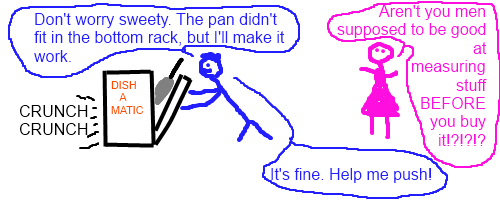Shopping for a dishwasher? Here are a few things you might want to consider…

DONT BUY SOMETHING YOUR DISHES WON'T FIT
– It's common to buy a dishwasher, install it, and then find that your existing dishes don't fit
well. Thus…
- when shopping for a dishwasher locally, bring a couple of your (clean) dishes into the store and try them out in the demo-dishwashers you're interested in. A large plate, a tall glass, and anything else that you frequently wash which might pose an issue (cutting boards, serving dishes, pans, etc).
- if you're shopping online, consider a model with adjustable (and/or removable) racks – it's still no guarantee that everything will fit, but it might buy you the extra inch or so that one of your favorite dishes need!

BARGAIN FOR A BETTER PRICE – it's rare that you need to pay full sticker price
- dishwashers have decent profit margins, and since they're often $500-1000+ in price, you can usually find sales people willing to discount the price. At the very least, it's usually possible to get free delivery thrown in.
- If you're not great at bargaining, here's a method that even the worst-bargainer can pull off, which works extremely well:
Price-compare first, and visit the retailer with the “best deal” last. Here's an example story to help you:
Barbara looks at dishwashers online and finds a Bosch model she's interested in at “Sears”, for a great price. She's ready to buy. However, she doesn't go to Sears to bargain – instead, she goes to “Super-Appliance-store” who has the same dishwasher, but for hundreds more.
The sales rep sees Barbara eyeing the Bosch dishwashers, and asks if he can help.
Barbara says “I'm interested in this Bosch dishwasher, but Sears has it for a lower price. I was hoping that maybe you guys had it for less. Is there anything you can do?”
Typically, the salesperson will check, and if possible, offer a better price. If they don't, thank them for their time and move on. If by the end you haven't found a better deal than the advertised price, the only thing you've lost is your time.
To add to the above, if you're determined to get the lowest-possible-price, mention that you're visiting a few retailers. Most (but not all) sales reps would rather give you a huge discount (and make little commission) rather than being beat by the competition (and get no commission). And they know that if they don't offer you the best price, the next retailer might. So keep that in mind.

CONSIDER BUYING ONLINE – while you can't bargain online, and lose out on the “hands on” experience, price comparing is easy, you'll often find models that aren't carried in-store, and won't be subjected to sales pressure. Depending on the online retailer, you might be able to wait for a great online-only sale, or use a coupon code to reduce the price further.

DETERMINE WHAT'S IMPORTANT TO YOU – prioritize
- do you want low operating costs – perhaps even something that saves enough energy to pay for itself over time? Look for models with the best energy star ratings.
- looking for longevity? Avoid plastic interiors/tubs. They tend to discolor, warp, melt, and eventually, leak over time. Stainless steel tubs tend to last (and look good) much longer. Nylon-coated-racks tend to last longer than Vinyl or PVC (which chip and crack more easily). Compare warranties between brands as well – manufacturers who offer longer warranties on various parts tend to have more faith in their product's abililty to stand the test of time.
- always having trouble fitting your dishes? Look for adjustable racks. Tall-tub dishwashers tend to have more capacity than short-tub dishwashers too.
- are you sensitive to dishwasher noise? Look for the acoustic rating (measured in dB or dBA) and compare between models. With the longer wash times of most models, you don't want something that annoys you for an hour while you're trying to visit, or watch the TV in the next room.
- cleaning ability – this is a little tougher to gauge by looking at the specifications. Typically, a dishwasher that has auto-temperature-control, heats the water & has a soil sensor stands a higher chance of doing a consistently-good job. However, you may want to check out Consumer Reports ratings, and do some Googling for reviews of the models you're considering.

DON'T OVERSPEND ON FEATURES YOU MAY NOT USE – while it's fair to say a “bargain bin” item is probably of less quality, once you've spent enough to pass that gap, price increases won't necessarily equate to better cleaning.
- What wash cycles do you tend to use? Dishwashers with 6+ cycles look great on the surface, but the reality is that most of us only use 1 or 2 cycles. The “Auto” wash feature in dishwashers with a soil sensor largely covers everything from light-to-heavy. And be honest – anything truly delicate usually gets washed by hand to be on the safe side.
- while a “Sanitize” feature looks nice on the surface, I've yet to hear of anyone with a healthy immune system that became sick because their home dishes weren't “sanitized”. In addition, a “Sanitize” setting simply ensures that the dishes were subjected to hot-enough water for a long-enough period of time to meet a certain standard. It doesn't actually check the water for micro-organisms, bacteria, etc to ensure that anything potentially-harmful is dead. It's a dishwasher, after all – not a laboratory.
- adjustable racks are convenient, but many people find a setting they like and never change it. Don't spend extra on a dishwasher with super-adjustable racks if you don't use them if dishes will fit the basic rack just fine.
- “no heat dry” sounds like a big energy saver, and it keeps plastic dishware from melting, but it often relies on you either wiping down the dishes manually with a towel, or using JetDry (or another rinse aid) in the machine. JetDry is a little pricey, though you'll use less of it if you have soft water. It's worth noting that some people use Vinegar as a rinse-aid to some degrees of success, though whether it's safe for a dishwasher in the short/long term is up for debate.
<<Back to Miscellaneous/FAQ page